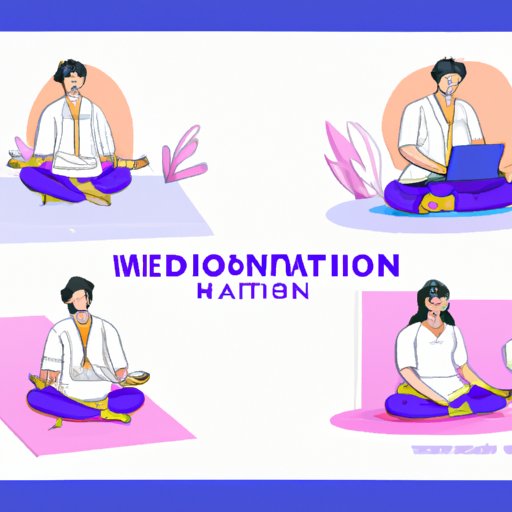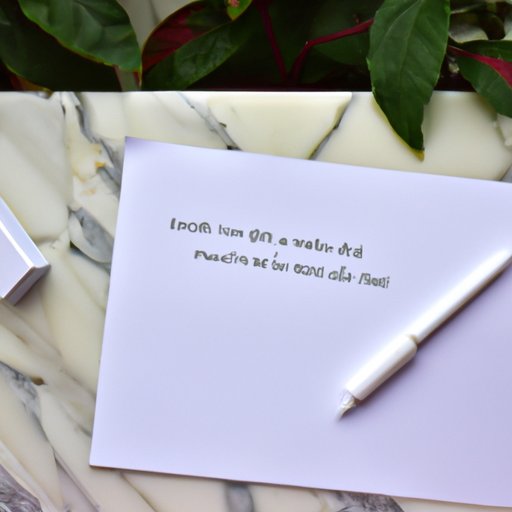
I. Introduction
Meditation is a practice that has been around for thousands of years, with many proven benefits for mental and physical health. However, for beginners or even experienced meditators, determining how long to meditate can be a daunting task. In this article, we will explore the science behind ideal meditation duration, provide guidelines for beginners, discuss how intention plays a role in determining duration, recommend ideal durations for different types of meditation, and offer tips for building a sustainable practice.
II. The science behind ideal meditation duration
Various studies have shown that the optimal amount of time to meditate for maximum benefits is about 20-30 minutes per session, but as little as 10 minutes can still provide significant results. Meditation for even shorter duration like a minute or so each hour can also help to reduce stress, improve focus and productivity in general. People who have been practicing meditation for longer periods of time report meditating for 45 minutes to an hour or more. However, most experts suggest that it is better to meditate consistently for shorter periods of time than to meditate for a longer duration sporadically. In short, consistency and regularity matter more than duration.
III. Meditation for beginners: How long to meditate when starting out?
For beginners, it is important to start with shorter sessions, usually around 5-10 minutes, and gradually increase the duration over time. It is best to ease into the practice rather than pushing oneself too hard too soon. This gradual approach will improve one’s ability to concentrate and stick to the practice longer. As one becomes more comfortable with meditation, they should aim for longer sessions; this allows one to better integrate practices into their daily routine and experience deeper benefits.
IV. The role of intention in determining how long to meditate for
Setting intentions and goals for meditation sessions can influence the ideal duration for each session. One’s goals for meditation may be to relieve stress from a difficult day or to cultivate compassion and self-awareness. Choosing an intention will allow a person to easily determine the duration of the sitting. For example, if the goal is to reduce stress, shorter sessions of 5-10 minutes might be more effective compared to longer duration for cultivating mindfulness or self-compassion.
V. Types of meditation and their ideal duration
There are many types of meditation practices, each with a different ideal duration:
– Mindfulness meditation: This practice involves maintaining focused concentration on the present moment. Beginners can start with a session of around 10-20 minutes and build their way up to 30 minutes or more.
– Loving-kindness meditation: This practice cultivates feelings of compassion and benevolence towards oneself and others. It usually involves choosing a set of phrases to repeat, and sessions can last about 10-20 minutes.
– Breath awareness meditation: This practice involves focusing solely on inhaling and exhaling breaths. Sessions are usually between 5-10 minutes, and participants may gradually increase the duration based on comfortability and concentration.

VI. How to build a meditation practice
To effectively build a meditation practice, consistency is key. Setting realistic goals often leads to longer-term success. Beginning with a shorter, more manageable duration is a good way to ease into a meditation practice. Practitioners can gradually increase the duration of their sessions by a few minutes each week or as they feel comfortable.
VII. The benefits of short and long meditation sessions
It is not unusual for beginners to hold the belief that longer meditation sessions lead to greater benefits. However, this is not necessarily true. Shorter sessions of even a minute or two every hour or half-hour has been known to help people alleviate stress and regain focus. Longer duration, on the other hand, is known to bring deep spiritual insights, clarity, and tranquility. It is about finding a balance and integrating short and long duration practices to fit your lifestyle and goals.
VIII. How to personalize your meditation duration
Ultimately, the ideal duration for meditation practice depends on one’s individual goals and experiences. Practitioners should look at different techniques and experiment with various durations to discover what works best for them. It is important to be open to trying different styles, lengths, and frequencies before choosing the perfect combination for your lifestyle.
IX. Conclusion
Meditation is a powerful tool for achieving mental and physical wellness. Determining the ideal duration is just as important as having an intention, choosing a technique, and practicing regularly. It is important to remember that consistency and regularity are more important than the length of time spent meditating. Finding what works best for an individual can be achieved by experimenting with the different recommended durations and listening to one’s body.





